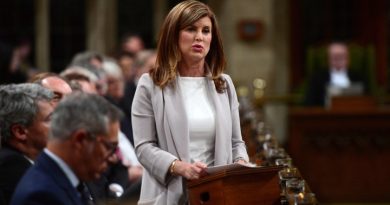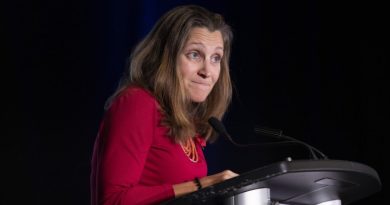People’s Party had minimal impact on election results, but sentiments persist
OTTAWA — The long-predicted vote split on the right between the federal Conservatives and the People’s Party of Canada failed to materialize in Monday’s election, but that doesn’t mean the sentiments that attracted some Canadians to the upstart party have gone away.
A riding-by-riding analysis by The Canadian Press shows the upstart PPC may have cost the Conservatives a handful of seats, but not enough to affect the overall results.
Although party leader Maxime Bernier in his concession speech Monday night suggested no one should write his party’s political obituary, his defeat, the party’s paltry election-night results and the high cost of running an election is likely to make any resurgence difficult.
“I think the future of the People’s Party is very in doubt when the one person who was leading it is gone and there are no apparent heirs and successors,” said former Conservative strategist and Summa Strategies vice-chairman Tim Powers. “Maybe this chapter is closed.”
He cautioned against closing the book on Bernier’s party.
The party’s message largely echoed right-wing populists that have had electoral success in the United States and parts of Europe, and echoed among some voters in Canada.
“There are people out there who are feeling disaffected, who are sensitive to and attuned to the politics of the negative, the politics of division, the politics of playing people off people and playing off stereotypes,” Powers said.
“That is worrying and it ought to be a worry for all parties — particularly as we’re talking about unity and tone and the like — that Maxime Bernier was able to get the attention that he did. Because he did get attention, a disproportionate amount.”
Leading into the election, there was an undercurrent of concern felt by some on the right that Bernier’s party would eat into the Conservatives’ core support in the same way the Reform party and Canadian Alliance hurt the Progressive Conservatives in the 1990s and early 2000s. Bernier, a former Harper-era cabinet minister who narrowly lost the 2017 Conservative leadership race to Andrew Scheer, founded the party a year ago by declaring the Tories “intellectually and morally corrupt” and lacking in true conservative principles.
The PPC nearly fielded an full slate of candidates across the country’s 338 ridings, and muscled Bernier into two televised debates organized by a federal commission, further fuelling the narrative of Conservative concerns. In the last week of the campaign, the Globe and Mail reported the Conservatives hired an outside firm to “seek and destroy” Bernier’s party, so concerned were they that the PPC would steal votes.
Scheer refused to confirm, deny or even acknowledge the report. Bernier subsequently filed a complaint with Elections Canada.
Whatever concerns the Conservatives had, however, appear to have been misplaced. Bernier’s party secured fewer than 300,000 votes — or 1.6 per cent of all ballots — across the country.
Assuming every vote cast for the PPC went instead to the Conservatives — and that’s no sure thing — the Tories would have taken six additional seats that went to the Liberals and another won by the New Democrats to increase their overall total to 128 seats instead of 121.
Putting the same assumption to the test in the New Brunswick riding of Fredericton, Green candidate Jenica Atwin would have won by 24 votes instead of 791, which would have also forced an official recount.
Despite all that, the Liberals would still have had enough seats to work with the NDP or Bloc Quebecois to keep their minority government alive in the coming session of Parliament.
“I do think the biggest non-story from the election is the failure of the People’s Party to make much headway,” said Steven Weldon, director of the Centre for the Study of Public Opinion and Political Representation at Simon Fraser University.
“I personally would have expected them to do a little bit better.”
Bernier was not available for an interview Wednesday.
Bernier campaigned against what he called “extreme multiculturalism,” promised to cut immigration levels and ensure new arrivals respond to Canada’s economic needs. He also promised to cut taxes, end corporate subsidies and encouraged provinces to develop their natural resources.
However, he also faced criticism from his rivals for not doing enough to weed out racists from his party and denying any scientific consensus humans are responsible for climate change. He was also blasted for describing 16-year-old climate activist Greta Thunberg as mentally unstable.
Weldon, who has studied the rise of populism in Europe and elsewhere, said research has shown it nearly always takes more than one election before populist movements are able to break through and become legitimate political parties.
“One of the questions was whether they would be able to breakthrough and they weren’t,” he said. “But what we do know is when these parties do break through, it’s often not in the first election. They are norm-breakers, basically, and breaking norms takes some time.
“Whether that will happen here or not is hard to say. It was a complete shutdown. Maxime Bernier didn’t win his seat, so the party essentially collapses at this point in time. But these kinds of sentiments, there are political actors out there who would like to take advantage of those.”
By: Lee Berthiaume, News from © The Canadian Press, 20XX. All rights reserved. This material may not be published, broadcast, rewritten or redistributed.




